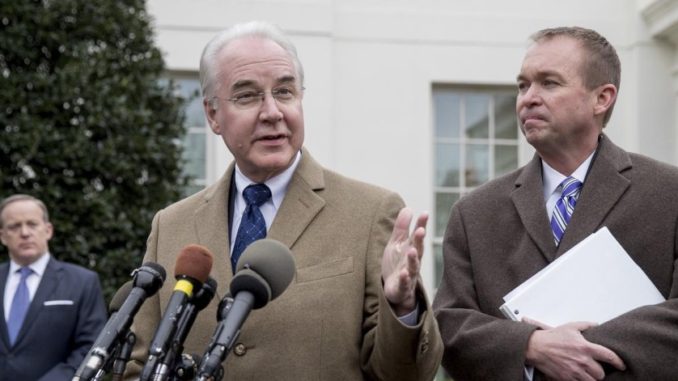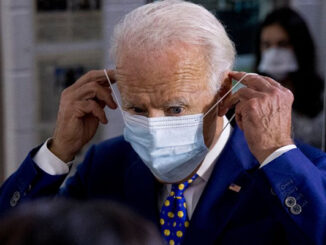
by Alexis Simendinger & James Arkin
As many as 24 million fewer Americans could have health insurance in a decade under Republican plans to repeal and replace Obamacare, the Congressional Budget Office estimated Monday.
The much-anticipated numbers from the nonpartisan CBO underscored the difficulty Republicans face as they work quickly to repeal and replace major tenets of the Affordable Care Act in Congress. Both conservatives and moderates have raised objections to the plan, which is backed by House leadership and passed two committees last week. CBO’s estimates for coverage loss could complicate Republicans’ path to secure the votes in both the House and Senate to pass their plan in the next month.
The CBO analysis projected that as many as 14 million fewer Americans could have health insurance next year under the Republican legislation when compared to the status quo under the Affordable Care Act. That number could rise to 24 million by 2026 as delayed changes to Medicaid kick in.
Democrats were quick to jump on the potential rise in uninsured Americans in criticizing the bill. Sen. Chuck Schumer, the Democratic leader, said it should be a “stop sign” for Republicans’ repeal efforts.
“The CBO’s estimate makes clear that TrumpCare will cause serious harm to millions of American families,” Schumer said in a statement. Tens of millions will lose their coverage, and millions more, particularly seniors, will have to pay more for health care. The CBO score shows just how empty the president’s promises — that everyone will be covered and costs will go down — have been.”
In addition to the coverage numbers, the CBO report estimated that the average cost of premiums could rise in the next two years, before dropping by as much as 10 percent compared to Obamacare by 2026. It also estimated that the Republican legislation would reduce federal deficits by $337 billion over the next decade.
Top Republicans on Capitol Hill praised the CBO score for its impact on premiums and the federal budget while mostly sidestepping the impact it could have on coverage. House Speaker Paul Ryan said on Fox News that he was “encouraged” by the report and that it exceeded his expectations.
“We’re saying that government is not going to force people to buy something they don’t want to buy, and if we end an Obamacare mandate that says you must buy this government one-size-fits-all plan, guess what? People aren’t going to buy that. So of course they’re going to suggest that if we’re not going to make people do something they don’t want to do, they’re not going to do it.”
Some Republican lawmakers showed more concern about the potential losses in coverage. Sen. Susan Collins, a moderate from Maine who has been concerned about the House health care plan, called the CBO report “cause for alarm” in a statement.
“These kinds of estimates are going to cause revisions in the bill almost certainly,” Collins told reporters Monday evening.
Administration officials raced to microphones after details of the CBO report of the Trump-backed House measure hit the news wires, knowing that the budget experts’ analysis would diminish already-uncertain chances for Senate passage and hopes for a bill-signing before Easter.
“We disagree strenuously” with the analysis, Health and Human Services Secretary Tom Price told reporters at the White House. Republicans seek universal choice for Americans to be able to select and pay for private insurance if they want it, not universal health coverage with federal mandates attached, he said.
“It’s just not believable, is what we would suggest,” Price said of the CBO report, offering a nod to Office of Management and Budget Director Mick Mulvaney, who stood next to him.
“The fact of the matter is, they’re going to be able to buy a coverage policy that they want for themselves and for their family,” Price said. “We believe the plan we’re putting in place is going to insure more individuals than currently are insured. So, we think that CBO simply has it wrong.”
Price and Mulvaney, who joined the Trump administration after serving in the House, both understand CBO’s honest-broker role in assessing the impact of legislation that moves through committees and to the floors of the House and Senate.
Over the weekend, both men denigrated the accuracy of CBO’s work, although independent evaluators have praised CBO as a “critical element of policymaking” that in 2010 succeeded in estimating Obamacare’s enrollment projections and costs with “reasonable” accuracy.
There was a muted reaction to the legislation on Capitol Hill – the House is out of session Monday and most senators voting in the evening said they hadn’t had time to read the entire report yet. But some threw cold water on the administration’s assertions that the CBO report should not be believed. Sen. Lindsey Graham said the party should assess carefully why CBO was predicting such a high loss of insurance under its plan.
“We like the CBO when they agree with us. When they don’t, they’re a bunch of losers,” Graham told reporters. “It is fair criticism to say that their numbers regarding Obamacare projected enrollments and costs were off. But they weren’t off 100 percent. If half of what they’re saying is true, then I think we should slow down and see if we address it.”
Price, Mulvaney, Ryan and other Republican lawmakers also faulted the congressional agency for failing to take into account GOP health-reform ambitions contemplated this year, but not yet introduced. For example, Price said separate bills will be unveiled later to alter health care coverage and pricing, as well as a raft of new federal rulemaking and elimination of Obama-era rules by HHS.
Although Price said CBO “ignored completely” what the White House calls phases two and three of the Obamacare replacement effort, it is not CBO’s role to analyze legislation that has not been introduced in Congress, let alone notice-and-comment regulatory proposals undertaken by HHS. (Federal rulemaking is intended to support existing law, not hoped-for legislation.)
White House Press Secretary Sean Spicer said lawmakers have a “philosophical” choice to believe what they wish about the eventual impact of the House-proposed health plan as introduced, and Senate Republicans do, too. Some GOP senators insist the House plan is a non-starter in the upper chamber.
“Obviously they’re going to look at the score. I get it,” Spicer said. “It’s an ongoing conversation with members of the House and ultimately the Senate with respect to whatever comes out.”
President Trump expressed frustration Monday, about an hour before CBO released its analysis, that recent news coverage describing the proposed health plan seemed tilted in favor of the existing Affordable Care Act and against Republicans’ efforts to jettison it.
“Obamacare, all of a sudden, the last couple of weeks, is getting a false rep that maybe it’s OK,” the president said during his first Cabinet meeting. “It’s not OK. “It’s a disaster, and people understand that it’s failed and it’s imploding.”



